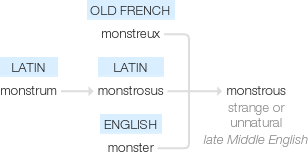Monstrous
late Middle English (in the sense ‘strange or unnatural’): from Old French monstreux or Latin monstrosus, from monstrum (see monster). Current senses date from the 16th century.
wiktionary
From Middle English monstrous, from Old French monstrueuse, monstrüos, from Latin mōnstrōsus. Compare monstruous.
etymonline
monstrous (adj.)
mid-15c., "of unnatural formation, deviating from the natural order, hideous," a variant of earlier monstruous (late 14c.), from Old French monstruos, monstrueuse and directly from Late Latin monstruosus "strange, unnatural, monstrous," from Latin monstrum "divine omen, portent, sign; abnormal shape; monster, monstrosity," figuratively "repulsive character, object of dread, awful deed, abomination," from root of monere "to admonish, warn, advise," from PIE *moneie- "to make think of, remind," suffixed (causative) form of root *men- (1) "to think."
Meaning "enormous, huge" is from c. 1500; that of "outrageously wrong, shocking, horrible" is from 1570s. The earlier form monstruous remained "very common in the 16th c." [OED]. As an adverb from c. 1600, but by late 19c. regarded as vulgar or colloquial. Related: Monstrously; monstrousness.
